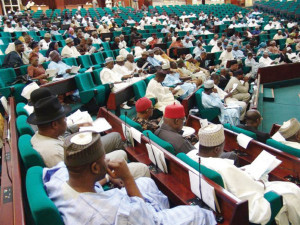 Members of the House of Representatives are intensifying their lobby for what they consider lucrative House committee positions, ahead of an announcement of committee membership by the speaker, Yakubu Dogara.
Members of the House of Representatives are intensifying their lobby for what they consider lucrative House committee positions, ahead of an announcement of committee membership by the speaker, Yakubu Dogara.
Barring any last minute change, Mr. Dogara will announce 95 House committees, and will appoint same number of chairpersons and deputies — the highest number yet in the history of the National Assembly — in what is seen as an attempt to ensure the committees go round the House’s 360 members.
The previous House session led by Aminu Tambuwal had 91 committees up from 64 during the tenure of Dimeji Bankole.
More than the services they are meant to offer, legislative committees are highly valued by Nigerian lawmakers because of the financial benefits and influence they bring,
The legislators regard some committees as “juicy”, and set out to be made leaders or members of such committees.
The most “lucrative” among the committees, according to lawmakers, is the budget committee, officially known as the Appropriation Committee. Others include committees on petroleum and gas, finance, communication, customs, public accounts and defence.
PREMIUM TIMES has exclusively obtained the report of a panel led by the deputy speaker, Yusuf Lasun, mandated to review the committees and assign members to them.
Other members of the body include Onawo Ogoshi, Babangida Ibrahim, Aisha Dukku, Ayo Omidiran, Betty Apiafi, and Goodluck Opia.
The panel has recommended 95 committees, and has ranked them as A, B and C.
Increasing the slots
Besides increasing the number of committees, the Lasun-panel split the Committee on Education into Basic Education Services and Tertiary Education Committees.
Committee on Health was also separated into Health Institutions and Healthcare Services.
There would now be Committees on Delegated Legislation, and Committee on Agriculture Colleges and Institutions, which is different from the existing Committee on Agriculture.
The panel said membership of each of the committees be pegged at 27, with the exception of committees with membership drawn from each of the 36 states and the Federal Capital Territory.
The committees that would have members from the 36 states and the FCT are nine. They are Committees on Appropriation, Public Accounts, House Services, Niger Delta Development Commission, Public Petitions, Federal Capital Territory, Federal Character, Constitutional Review and Constituency Outreach.
Membership of the committees would also reflect zonal representation based on the number of representatives from each of the six geo-political zones.
North West, with 92 representatives, would have seven members in all the committees, followed by South West, with 71 members, which has five members in all the committees.
South South, with 55 representatives, North-Central, with 51 representatives, and North-East, with 48 representatives, are to have four members each in all the committees.
South East, which has the least number of representatives at 43, would have three members in all the committees.
Also, any member of the Appropriation Committee, regarded as the “juiciest”, must not be the Chairman or Deputy Chairman of another committee, the panel said.
Similarly, no member is going to belong to more than one of the Appropriations, Public Accounts, Finance and House Services.
Politics of ranking
The Lasun-committee ranked 30 committees as Grade A; 34 as Grade B; and 31 as Grade C.
The grading of committees should be based on their importance with regards to government ministries, departments and agencies under their purview.
Akinlabi Mudashiru, a former lawmaker and special adviser on legislative matters to Mr. Lasun, denied the committees were ranked for financial benefits of members.
He said they were graded to reflect the policy thrust of the government.
“For instance, Grade A committees are those with ministries or major policy thrusts like aviation, education. While those with subsidiary jurisdictions or parastatals are in Grade B or C,” he said.
He also said the grading is expected to help the selection committee easily assign members.
But some lawmakers who spoke to PREMIUM TIMES in confidence said while that claim was not entirely untrue, the committees were essentially graded according to their potential benefits and clout. They cited the potential of members being able to access contracts.
Already, the grading — which is not authorised by the House rules – is causing rumblings among the All Progressives Congress lawmakers, especially those who opposed the election of Yakubu Dogara as speaker.
The APC lawmakers told PREMIUM TIMES some “juicy” committees which were previously in Grade A were moved to Grade B or Grade C and that some “less important ones” have been moved up to Grade A.
This, according to the lawmakers who asked not to be named because of the sensitivity of the matter, was designed by Mr. Dogara to subtly compensate the Peoples Democratic Party lawmakers who supported his election.
“Once the juicy committees now put in Grade C are given to our colleagues from PDP, there will not be complaint because at least the Speaker will say the committees are Grade C even though they are some of the biggest,” a lawmaker from South-West said.
Examples of the committees which are in Grade C but allegedly reserved for Mr. Dogara’s loyalists in PDP are those on Solid Minerals Development, Privatisation and Commercialisation, Women Affairs and Social Development.
Another APC lawmaker pointed at the Committee on Solid Minerals. He said there was no way the committee could be regarded as Grade C, “especially when Buhari is talking about diversification of the economy”.
However, a member, Danlami Kurfi (APC-Dutsinma/Kurfi Federal Constituency) said what was considered “juicy” may not be so in the new dispensation under President Muhammadu Buhari.
“Service ought to be the end we have in view as representatives of the people, not any other ulterior motive,” he said.
The SA to the deputy speaker, Mr. Mudashiru, also denied some committees were reserved for PDP members.
END

Be the first to comment